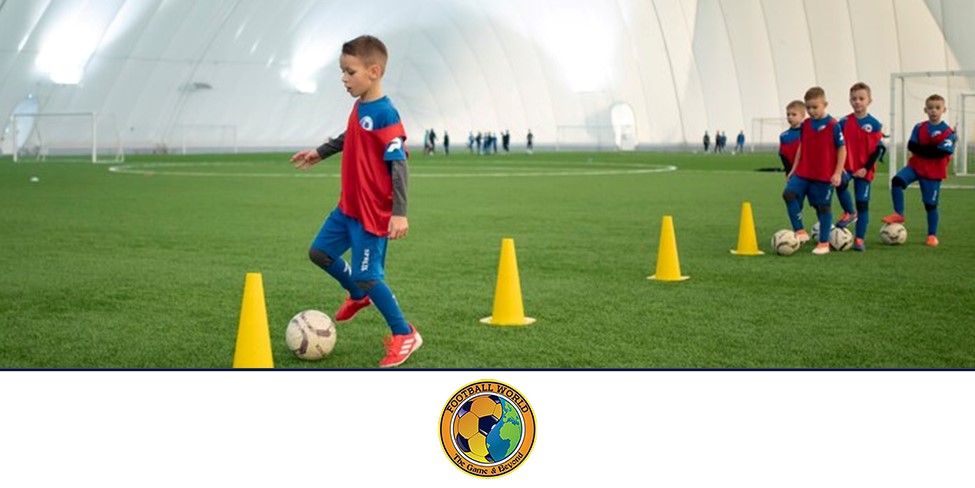 Have you ever wondered why some young athletes lose interest in their football training and drop out? Delving into this common phenomenon sheds light on crucial aspects that impact a child’s persistence in sports. While the enthusiasm for football may be high initially, various factors come into play that could lead to a decline in participation. Understanding these elements is key to fostering a supportive environment for young players to thrive and stay committed to their training regimen. Let us explore the 12 significant factors contributing to children’s discontinuation of football practice and how we can address them effectively.
Have you ever wondered why some young athletes lose interest in their football training and drop out? Delving into this common phenomenon sheds light on crucial aspects that impact a child’s persistence in sports. While the enthusiasm for football may be high initially, various factors come into play that could lead to a decline in participation. Understanding these elements is key to fostering a supportive environment for young players to thrive and stay committed to their training regimen. Let us explore the 12 significant factors contributing to children’s discontinuation of football practice and how we can address them effectively.
- Lack of Parental Support and Involvement

One significant factor contributing to children discontinuing their football practice is the lack of parental support and involvement. Parents play a crucial role in nurturing a child’s interest in sports, including enrolling them at the football academy in Thane. When parents show little interest in or fail to encourage their children’s participation in football, it can lead to disengagement and an eventual dropout from the sport.
Without parental support, young players may struggle to stay motivated or feel that their efforts are not appreciated. Therefore, fostering a supportive environment at home is essential for sustaining a child’s enthusiasm for football and ensuring their continued participation in training.
2.Setting Specific Goals: Tailoring Your Training for Success with Sports Coaching
In the competitive world of sports, young athletes often face immense pressure to excel and perform. This pressure can come from various sources, including parents, coaches, peers, and even themselves. The constant push to meet expectations and achieve success can sometimes become overwhelming for children involved in football coaching Mumbai. Look for football coaching in Mumbai that provides a platform for young talents to develop their skills and passion for the sport. However, the relentless focus on performance can lead some children to feel burned out or disheartened. It is crucial for coaches and parents to strike a balance between nurturing talent and ensuring a positive experience for young players. By creating a supportive environment that prioritizes growth and enjoyment over winning at all costs, we can help retain more aspiring footballers in the game.
3. Burnout and Overtraining
Excessive training and burnout can lead children to lose interest in football. When young athletes are pushed too hard without adequate rest, they can experience physical and mental exhaustion, ultimately causing them to quit the sport. Overtraining not only affects their performance but also increases the risk of injuries.
It is crucial for coaches and parents to recognize the signs of burnout in children, such as decreased motivation, irritability, and fatigue. Balancing rigorous training with sufficient rest periods is essential in preventing burnout and ensuring that young players continue to enjoy playing football for years to come. Proper guidance and support can help young athletes navigate the challenges of intense training schedules while maintaining their passion for the sport.
4. Negative Coaching Experiences
Excessive training and burnout can lead children to lose interest in football. When young athletes are pushed too hard without adequate rest, they can experience physical and mental exhaustion, ultimately causing them to quit the sport. Overtraining not only affects their performance but also increases the risk of injuries.
It is crucial for coaches and parents to recognize the signs of burnout in children, such as decreased motivation, irritability, and fatigue. Balancing rigorous training with sufficient rest periods is essential in preventing burnout and ensuring that young players continue to enjoy playing football for years to come. Proper guidance and support can help young athletes navigate the challenges of intense training schedules while maintaining their passion for the sport.
5. Injury and Fear of Injury
Injury and fear of injury are significant factors contributing to children’s discontinuation of football practice. The physical nature of the sport predisposes players to various injuries, ranging from minor sprains to more serious conditions. Parents and young players alike often harbor concerns about the risks involved in playing football, leading to apprehension and reluctance to continue with training sessions.
Coaches play a crucial role in mitigating these fears by implementing proper injury prevention techniques and emphasizing safety during practices. Creating a safe and supportive environment where players feel secure and well-protected is essential to fostering their continued engagement with the sport. By addressing these concerns proactively, football coaching can help nurture a generation of resilient and committed young athletes.
6. Peer Influence and Social Dynamics
Peer influence and social dynamics play a crucial role in determining a child’s continuity in football practice. Children are often influenced by their peers, who may decide to quit due to various reasons, such as lack of interest or time commitment.
Social dynamics within a team setting can also affect a child’s motivation and enjoyment of the sport. Understanding these factors is essential for coaches and parents alike to provide adequate support and encouragement to young players. By addressing peer influence and fostering a positive team environment, children are more likely to stay engaged and committed to their football practice journey.
7.Academic Commitments and Time Management
Academic commitments often play a crucial role in children discontinuing football practice. As young athletes juggle school responsibilities and extracurricular activities, time management becomes challenging. The demanding nature of academic work can lead to prioritizing studies over sports, especially during exam periods or when assignments pile up. Balancing homework, projects, and test preparations with football practice becomes overwhelming for many children.
Additionally, parents may emphasize academic success over sports participation, influencing their children’s decisions regarding time allocation. Lack of sufficient time for rest and recreation due to heavy academic loads can also contribute to fatigue and burnout among young football enthusiasts. Encouraging a healthy balance between academics and sports is essential to supporting children’s holistic development and long-term engagement in physical activities.
8.Financial Constraints and Access to Resources
Financial constraints and access to resources play a significant role in determining children’s continuation of football practice. Looking for affordable football coaching with fees is crucial, as families with limited financial means may struggle to afford the expenses associated with training and equipment. In some cases, the lack of access to proper facilities and quality coaching due to high fees can hinder children from pursuing their passion for football. Despite the love for the sport, economic barriers create obstacles that may lead to the discontinuation of practice.
Addressing these challenges by providing opportunities for all socio-economic backgrounds with affordable football coaching with fees can help in retaining young talents and ensuring inclusivity in sports participation
9.Lack of Motivation and Goal Setting
Lack of motivation and goal setting are crucial factors contributing to children’s discontinuation of football practice. Without clear objectives and a drive to improve, young players may find it challenging to stay committed to their training. Enrolling your child in football coaching in Mumbai can play a vital role in addressing these issues by instilling motivation and helping players set achievable goals.
In coaching, coaches will work closely with young athletes to understand their individual aspirations and tailor training programs accordingly. By fostering a supportive environment that encourages goal-oriented behavior, coaches can help children stay engaged and dedicated to their football journey. Emphasizing the importance of setting both short-term milestones and long-term goals can significantly boost player retention rates in youth football programs.
10. Inadequate Facilities and Infrastructure
Adequate facilities and infrastructure in football academies play a pivotal role in ensuring the continuity of children’s engagement in football practice. Insufficient facilities, such as poorly maintained grounds, a lack of proper equipment, or inadequate changing rooms, can demotivate young players and lead to their discontinuation of practice.
The availability of well-equipped training grounds, proper lighting, quality coaching staff, and comfortable amenities are crucial factors that contribute to creating a conducive environment for young athletes to thrive in their football journey. Look for a football academy in Thane that will provide the necessary resources, which can significantly impact the retention and progress of aspiring footballers at a grassroots level.
11. Gender Stereotypes and Discrimination
Gender stereotypes and discrimination can significantly impact children’s interest in continuing football practice. When girls are discouraged from sports due to outdated beliefs or boys face ridicule for pursuing activities deemed “feminine,” it creates barriers to their participation. The lack of representation and support for diverse gender identities within the sporting community can also lead to feelings of exclusion.
Addressing these issues requires a shift in societal norms and fostering an inclusive environment within sports programs. Coaches and parents play a crucial role in challenging stereotypes and promoting equal opportunities for all aspiring athletes. By creating a more welcoming space where children feel accepted regardless of their gender, we can help mitigate the factors contributing to the discontinuation of football practice among young players.
12. Mental Health Challenges and Stress
Mental health challenges and stress can significantly impact children’s participation in football practice. Factors contributing to discontinuation may include performance pressure, fear of failure, and burnout from intense training schedules. Additionally, issues like lack of support from coaches or teammates, feelings of inadequacy, and external demands such as academic pressures can also play a role.
It is crucial for parents, coaches, and administrators to recognize these stressors and provide appropriate support systems for young athletes. Creating a positive environment that promotes mental well-being, resilience-building strategies, and open communication channels can help address these challenges effectively. Prioritizing mental health alongside physical training is essential to nurturing well-rounded individuals in sports.
It is crucial to recognize the multifaceted factors that contribute to children discontinuing football practice. By addressing issues such as lack of parental support, unrealistic expectations, injuries, and burnout, coaches and parents can work together to create a more supportive environment for young athletes.
Providing positive reinforcement, diverse training methods, and opportunities for social engagement can help keep children motivated and committed to their sport. Emphasizing fun and skill development over competition can also foster a love for the game that extends beyond setbacks. Ultimately, by understanding these factors and actively working to mitigate them, we can help ensure that more children continue to enjoy the benefits of participating in football and sports in general.
